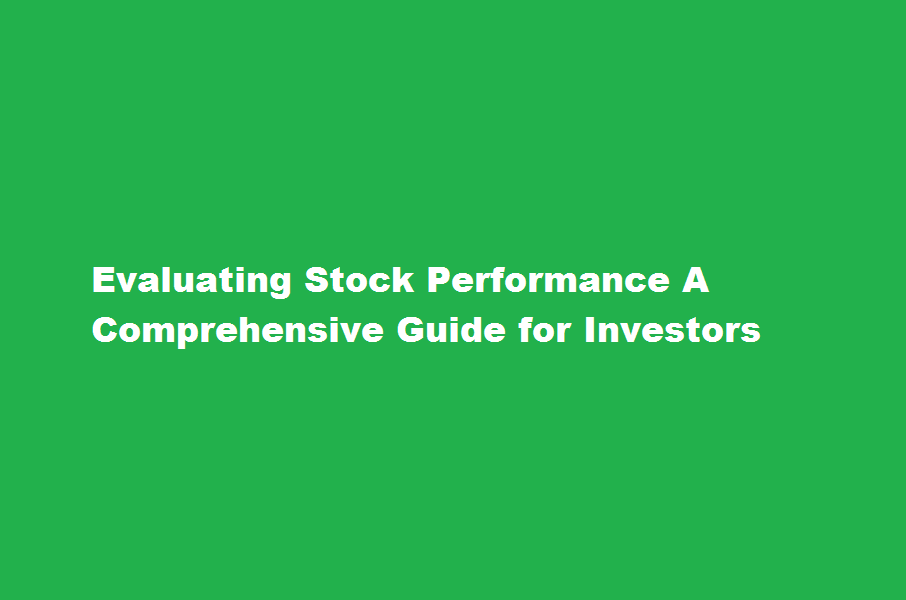Evaluating Stock Performance A Comprehensive Guide for Investors
3 min read
Introduction
When investing in the stock market, it’s crucial to evaluate the performance of stocks before making any investment decisions. Evaluating stock performance involves analyzing various factors and metrics to determine whether a stock is a good investment opportunity. This comprehensive guide will walk you through the essential steps and provide insights into evaluating stock performance effectively.
Understanding Financial Statements
To evaluate the performance of a stock, start by examining the company’s financial statements. Key documents include the income statement, balance sheet, and cash flow statement. These statements provide insights into the company’s revenue, expenses, assets, liabilities, and cash flow over a specific period.
Fundamental Analysis
Fundamental analysis involves assessing a company’s financial health, competitive position, and growth potential. Key factors to consider include earnings per share (EPS), price-to-earnings (P/E) ratio, revenue growth, profit margins, and return on equity (ROE). Compare these metrics with industry averages and historical performance to gauge the stock’s performance.
Analyzing Market Trends
Evaluate how the stock performs in relation to broader market trends. Consider market capitalization, sector performance, and macroeconomic indicators. A stock that outperforms its peers and demonstrates resilience during market downturns may indicate strong performance.
Assessing Valuation
Determine whether the stock is undervalued or overvalued by comparing its current price to its intrinsic value. Common valuation methods include price-to-earnings ratio, price-to-book ratio, and discounted cash flow analysis. A stock trading below its intrinsic value may present a potential buying opportunity.
Technical Analysis
In addition to fundamental analysis, consider using technical analysis to evaluate stock performance. Technical analysis examines historical price patterns, trading volume, and indicators to predict future price movements. Popular technical indicators include moving averages, relative strength index (RSI), and Bollinger Bands.
Management and Corporate Governance
Assess the quality and track record of the company’s management team. Look for experienced leaders who have delivered consistent results. Analyze corporate governance practices, including transparency, board independence, and executive compensation, to gain confidence in the stock’s performance potential.
Industry and Competitive Analysis
Evaluate the company’s industry and competitive landscape. Identify potential risks and opportunities arising from market dynamics, competition, and technological advancements. A stock in a growing industry with a competitive advantage may have better performance potential.
Frequently Asked Questions
What is the best metric to evaluate a stock’s performance?
There is no single metric that determines a stock’s performance. It’s essential to consider a combination of factors, including revenue growth, profitability, valuation ratios, and industry comparisons.
How do I compare a stock’s performance to its industry peers?
Compare key financial ratios, growth rates, and market share of the stock with its industry peers. This analysis helps identify if a stock is outperforming or underperforming its competitors.
Can past performance predict future stock performance?
Past performance provides insights but doesn’t guarantee future results. Evaluate a stock’s historical performance alongside other factors such as industry trends, management quality, and economic conditions.
Is it important to consider a stock’s dividend yield when evaluating performance?
Dividend yield is relevant for income-focused investors. It reflects the cash return on investment and can contribute to overall stock performance. However, it’s not the sole determinant of a stock’s performance.
How often should I reevaluate a stock’s performance?
Regularly review a stock’s performance by monitoring quarterly earnings reports, industry news, and macroeconomic factors. Consider reevaluating the stock’s performance whenever significant events or changes occur.
Conclusion
Evaluating stock performance requires a comprehensive approach that combines fundamental and technical analysis, market trends, and industry dynamics. By considering various factors and metrics, investors can make informed decisions and enhance their chances of success in the stock market. Remember, thorough research and analysis are key to evaluating stock performance effectively.
Read Also : Harnessing The Power of Social Media in Your Job Search






